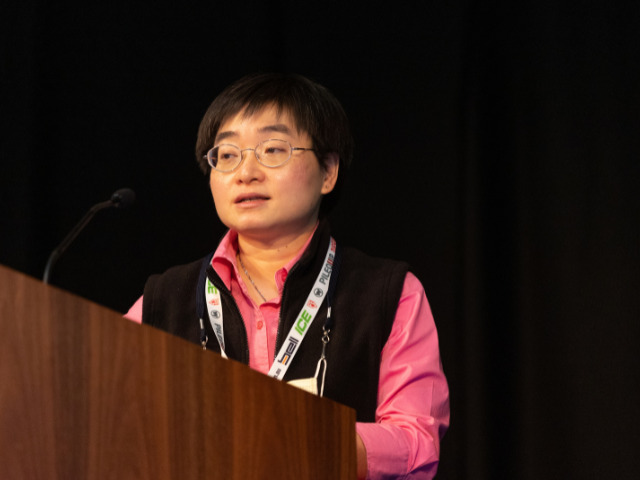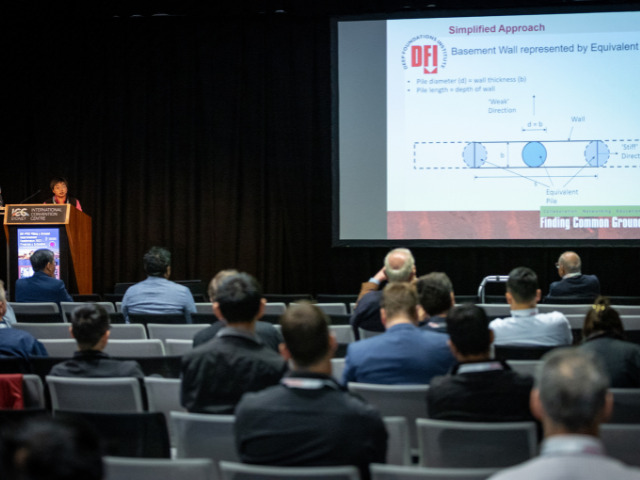
Tetra Tech Coffey’s Helen Chow is a Senior Geotechnical Engineer based in Sydney, Australia. With over 15 years’ experience, Helen works with clients designing foundations for some of Sydney’s tallest new developments. Along with delivering design and geotechnical expertise, her in-depth knowledge in the field of retention system and foundation design in the built environment has led her own investigations and research, recently publishing her findings.
Her presentation of her technical paper at the joint conference of the Piling and Foundation Specialists Federation (PFSF) and Deep Foundations Institute (DFI) in November 2022 in Sydney, Australia showcased her research into basement walls contributing to foundation performance.
Promoting all aspects of deep foundations, and retention and ground improvement works, Helen’s paper was well received by experts from across the region. Here Helen shares her insights into this exciting research into this important field of geotechnical study.
Tell us a bit more about what drove you to do this research?
Basement walls are crucial to foundation performance in any built environment. Given the foundation system consists of various components including foundation piles, basement slab and basement walls, each component are interacting with each other.
I wanted to look at how the basement wall contributes to the foundation performance, for example the settlement of the foundation or the differential settlement of the foundations, and how do other structural elements in the building, like the walls and the floor slabs impact this.
My paper is titled the ‘Approximate assessment of basement wall effects on foundation performance’ – and my investigations have revealed that there is a more simplified approach to do the analysis of basement walls, giving engineers a better understanding of the structural performance of their foundation without the need to conduct a time consumed three-dimensional (3D) finite element analysis.
Where do you see your research being applied?
Typically, engineers would perform a 3rd-Dimensional analysis, but our research has found that they can use an approximation method to do the analysis to get some idea how the basement wall is contributing to the overall foundation performance.
The simplified approach has shown that along with the reduction in the settlement, the basement walls can contribute to the redistribution of pile loads and engineers can get some idea of the magnitude of pile loads without running the 3D analysis because the 3D analysis is quite time consuming.
Verification of our simplified approach was conducted using 3D analysis, and shown relative consistent results, this demonstrated our approach could save time and give greater assurances to engineers and building operators.
How long were you working on the research or all the paper?
About 12 months of investigations and data analysis to date. Tetra Tech Coffey’s team has deep experience and capabilities in all areas of Geotechnical engineering, and it was wonderful to have the support of my colleague Professor Harry Poulos who assisted me with my research.
This is not the only paper and research I have been working on. I can’t say much right now, but I will be presenting more work in 2023. So, watch this space!
When you are not researching, where can we find you in the field.
The Sydney CBD continues to expand and grow, and right now I am currently working on several key projects in the heart of the city. The Bligh Street project in the Sydney CBD has been a terrific and geotechnically challenging project for me to work on, along with the Lego Building also located in the city. The project is still ongoing.
Being in such a complex-built environment, as a Geotechnical Engineer you are challenged to work and assess within existing environments with considerations to tunnel impact assessments and also the impact assessment for the adjacent building and also the utilities. I am also working on another tall structure in the Barangaroo precinct, adjacent to the new Barangaroo station. It is just great to be able to contribute to these landmark projects.
What do you enjoy about the work you do or maybe working at Tetra Tech Coffey?
One of the great things about working at Tetra Tech is it brings together some of the leading minds in this field with the most enjoyable part being the culture, to me it’s like ‘a family’. In my line of work, we always run into situations that need consultation with my peers. I have always been able to get advice on my work or research and for me that has been the great advantage of working here at Tetra Tech.
For our junior people and emerging leaders ‘they get the best of all worlds’. They get to do field work on some amazing, but also get that development by working alongside our more senior staff.
Connect with Helen at Helen.Chow@tetratech.com
